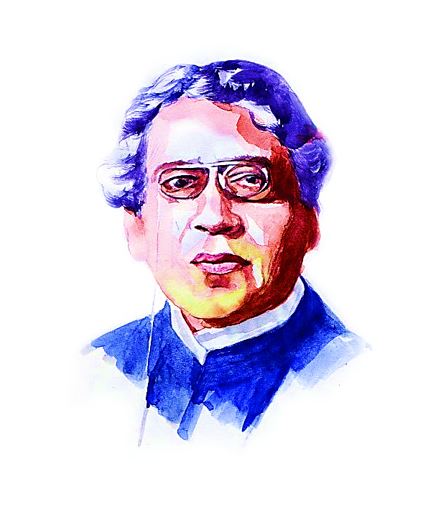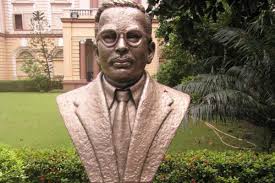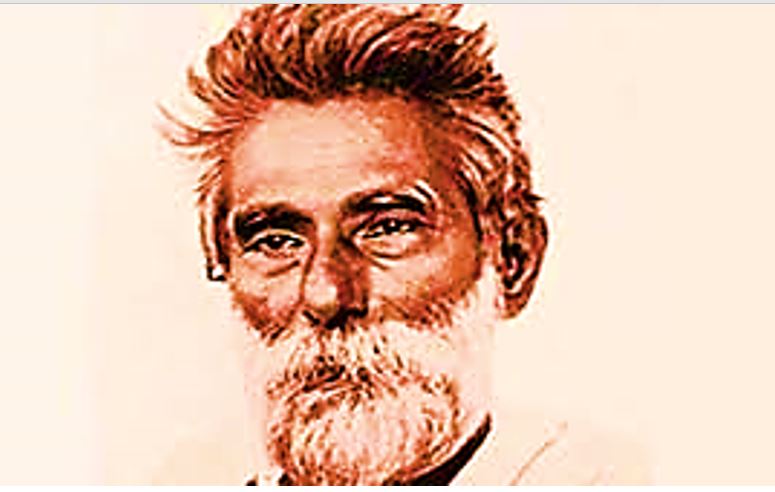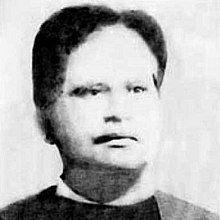“দ্বিজাতি তত্ব -কে কি বলেছেন”
ডাঃ মৃনাল কান্তি দেবনাথ
***** দ্বিজাতি তত্ব এবং সেই তত্বকে আশ্রয় করে দেশ ভাগ নিয়ে অনেকের মনে অনেক ধন্ধ আছে । যা জেনেছি তাই তুলে দিলাম। অনেকে, বীর সাভারকরকে এই দ্বিজাতি তত্বের পুরোধা বলে। এর চেয়ে চরম মিত্যা আর হতে পারে না। লেখাটা প্রথম ভাগ বাংলায় তর্জমা করেছি। নীচের অংশ টা সময়াভাবে করে ঊঠতে পারলাম না।******
ব্রিটিশ “ভারত রাষ্ট্র” এই কথাটি কোনোদিন বলেনি। তারা শুধু বলতো ভারত, একটি দেশ বা অঞ্চল হিসাবে।
হিন্দুরা ভারতবর্ষকে শুধু মাত্র একটি ভুখন্ড বা অঞ্চল হিসাবে কোনোদিন দেখেনি। তারা ভারত বর্ষ কে মাতৃজ্ঞানে পুজা করে এসেছে সেই বৈদিক যুগ থেকে। এই দেশ টীকে বলা হয় জম্বুদ্বীপের ভারত খন্ডে। যে কোনো পুজা অর্চনায় সংকল্প করার আগে পুরোহিত আজো যজমানের পরিচয় দিতে ওই কথাটা দিয়ে শুরু করে “ জম্বুদ্বীপে,ভারত খন্ডে”।
British never considered “Bharat as a Nation” but an administrative territory. But the Hindus considered Bharat not only as one Nation but also revered as “Mother”. Any Hindu religious ceremony starts with the priest saying “ at Bharat khand, Jambudeep”.
ইসলাম ভারতে আসে এক বৈদেশিক আক্রমন কারীর হিসাবে, ঘোড়ায় চড়ে হাতে তলোয়ার নিয়ে,অত্যচার এবং অনাচারের প্রতীক হিসাবে। সংগে নিয়ে আসে সম্পুর্ন ভিন্ন, বিপরীত উপাসনা পদ্ধতি, ধর্মীয় দর্শন,খাদ্যা ভাস, পোষাক পরিচ্ছদ, আচার বিশ্বাস। তারা আসে বিভিন্ন দেশ থেকে, আরব থেকে, আফগানিস্তান থেকে, ইরান থেকে, মধ্য এশিয়া থেকে। তাই ১০০০ বছর ভারত দখল করে রাখলেও নিজেরাই নিজেদের মধ্যে সম্পৃক্ত হয়ে উঠতে পারেনি।
পাকিস্তানের প্রথম প্রধানমন্ত্রী লিয়াকত আলী খান বললেন “ভারতীয় মুসলিম এখনো একটি সম্পৃক্ত জাতি হয়ে ওঠেনি তবে করা যেতে পারে। Liaquat Ali Khan (later Prime Minister of Pakistan) argued that Indian Muslims were not yet a Nation but could be forged into one.
পাকিস্তানের পাঠ্য পুস্তকে আজো আরব থেকে আসা ‘মুহাম্মদ বিন কাসিম’ কে “প্রথম পাকিস্তানী” বলে সম্মানিত করা হয়। ঐতিকাসিক প্রকাশ কে সিং বলেন “ মুহাম্মদ বিন কাসিমের ভারতে আসা পাকিস্তান সৃষ্টির প্রথম ধাপ”.
মুহাম্মদ আলী জিন্না বলেছে, প্রথম মুসলিম যেদিন “ইসলামের প্রবেশ দ্বারে (সিন্ধু) এলো, সেই দিন থেকে পাকিস্তান আন্দোলন শুরু হয়েছে”
According to the Pakistan Studies curriculum Muhammad bin Qasim is often referred to as the first Pakistani. While Prakash K. Singh attributes the arrival of Muhammad bin Qasim as the first step towards the creation of Pakistan. Muhammad Ali Jinnah considered the Pakistan movement to have started when the first Muslim put a foot in the Gateway of Islam(Sindh).
ব্রিটিশদের দ্বারা ক্ষমতাচ্যুত ভারতীয় মুসলিমদের রাজনৈতিক উত্থান এবং এক ‘ভিন্ন পরিচয়’ শুরু করেন স্যার সৈয়দ আহমেদ। অনেক পাকিস্তানী পন্ডিত তাকেই “দ্বিজাতি তত্বের মুল কারিগর” বলে মান্যতা দেন। কবি আল্লামা ইকবাল সেই দ্বিজাতি তত্বকে দার্শনিক রুপ দেন, আর জিন্না সেই দ্বিজাতি তত্ব’ কে রাজনৈতিক ভাবে বাস্তব রুপ দেন।
The movement for Muslim self-awakening and identity was started by the Muslim modernist and reformer Syed Ahmad Khan (1817–1898). Many Pakistanis describe him as the architect of the two-nation theory.
The poet philosopher Muhammad Iqbal (1877–1938) provided the philosophical exposition and Barrister Muhammad Ali Jinnah (1871–1948) translated it into the political reality of a nation-state. Allama Iqbal’s presidential address to the Muslim League on 29 December 1930 is seen by some as the first exposition of the two-nation theory in support of what would ultimately become Pakistan.
মুসলিম পন্ডিত এবং ঐতিহাসিক “আলবেরুনী” একাদশ শতাব্দীতেই বলেন, হিন্দুরা এবং মুসলিমরা সব ব্যাপারেই এবং সব অভ্যাসেই বিরোধী।
১৯৪০ সালের ২৩ শে মার্চ জিন্না ‘মুস্লীম লীগের লাহোর আধিবেশনে পাকিস্তান প্রস্তাব গ্রহন করার সময় আলবেরুনীর সেই তত্বকেই আকড়ে ধরে। জিন্না বলে, “হিন্দুরা এবং মুসলিমরা দুই ভিন্ন ধর্মীয় দর্শন এবং সামাজিক নীতী রীতী, সাহিত্য, বৈবাহিক সম্পর্ক বিবর্জিত এবং পরস্পর বিরোধী ভাবনা এবং ধারনা যক্ত দুই জাতি। ১০০০ বছরের সহাবস্থানের ইতিহাস থাকা সত্বেও এই দুই সম্প্রদায় কোনোদিন এক পারস্পরিক সৌহার্দ তৈরী করতে পারেনি।
দেশ ভাগের পর ১৯৪৮ সালে জিন্না বলে-“ ইসলাম আমাদের এই শিক্ষাই দিয়েছে। আমার মনে হয় আপনারা আমার সংগে একমত হবেন যে, তোমরা যেই হও, আর যেখানেই থাকো তোমরা “মুসলিম”। আজ তোমাদের একটি দেশ হয়েছে, তোমরা একটি অঞ্চল ভাগ করে নিয়েছো, একটি বিশাল অঞ্চল, এই অঞ্চল আজ তোমাদের।
The scholar Al-Biruni (973–1048) had observed, at the beginning of the eleventh century, that Hindus and Muslims differed in all matters and habits.
On 23 March 1940, Jinnah made a speech in Lahore which was very similar to Al-Biruni’s thesis in theme and tone. Jinnah stated that Hindus and Muslims belonged to two different religious philosophies, with different social customs and literature, with no intermarriage and based on conflicting ideas and concepts. Their outlook on life and of life was different and despite 1000 years of history, the relations between the Hindus and Muslims could not attain the level of cordiality.
In 1948, Jinnah said:
Islam has taught us this and I think you will agree with me, for whatever you may be and wherever you are, you are a Muslim. You belong to a nation now. You have carved out a territory, a vast territory, it is all yours; it does not belong to a Punjabi or a Sindhi or a Pathan or a Bengali, it is yours.
মাত্র ৭৫ বছর আগে ঈকবাল আরো যা মারাত্মক সাম্প্রদায়িক ইক্তি করেছিলো, আমি সেই উক্তি সরাসরি তুলে দিলাম, পড়ে এবং জেনে নিন।
Muhammad Iqbal had also championed the notion of pan-Islamic nationhood (see: Ummah) and strongly condemned the concept of a territory-based nation as anti-Islamic: “In tāzah xudā’ōⁿ mēⁿ, baṙā sab sē; waṭan hai: Jō pairahan is kā hai; woh maẕhab kā, kafan hai… (Of all these new [false] gods, the biggest; is the motherland (waṭan): Its garment; is [actually] the death-shroud, of religion…)” He had stated the dissolution of ethnic nationalities into a unified Muslim society (or millat) as the ultimate goal: “Butān-e raⁿŋg ō-xūⁿ kō tōṙ kar millat mēⁿ gum hō jā; Nah Tūrānī rahē bāqī, nah Īrānī, nah Afġānī (Destroy the idols of color and blood ties, and merge into the Muslim society; Let no Turanians remain, neither Iranians, nor Afghans)”
ভীমরাও আম্বেদকর কি বললেন ?—–
In his 1945 book Pakistan, or The Partition of India, Indian statesman and Buddhist Bhimrao Ramji Ambedkar wrote a sub-chapter titled “If Muslims truly and deeply desire Pakistan, their choice ought to be accepted”. He asserted that, if the Muslims were bent on the creation of Pakistan, the demand should be conceded in the interest of the safety of India. He asks whether Muslims in the army could be trusted to defend India in the event of Muslims invading India or in the case of a Muslim rebellion. “Whom would the Indian Muslims in the army side with?” he questioned. According to him, the assumption that Hindus and Muslims could live under one state if they were distinct nations was but “an empty sermon, a mad project, to which no sane man would agree”.
.
In Muhammad Ali Jinnah’s All India Muslim League presidential address delivered in Lahore, on 22 March 1940, he explained:
It is extremely difficult to appreciate why our Hindu friends fail to understand the real nature of Islam and Hinduism. They are not religions in the strict sense of the word, but are, in fact, different and distinct social orders, and it is a dream that the Hindus and Muslims can ever evolve a common nationality। The Hindus and Muslims belong to two different religious philosophies, social customs, litterateurs. They belong to two different civilizations which are based mainly on conflicting ideas and conceptions. Their aspect on life and of life are different. It is quite clear that Hindus and Mussalmans derive their inspiration from different sources of history. They have different epics, different heroes, and different episodes. Very often the hero of one is a foe of the other and, likewise, their victories and defeats overlap. To yoke together two such nations under a single state, one as a numerical minority and the other as a majority, must lead to growing discontent and final destruction of any fabric that may be so built for the government of such a state.
In 1944, Jinnah said:
We maintain and hold that Muslims and Hindus are two major nations by any definition or test of a nation. We are a nation of hundred million and what is more, we are a nation with our own distinctive culture and civilization, language and literature, art and architecture, names and nomenclature, sense of values and proportions, legal laws and moral codes, customs and calendar, history and tradition, and aptitude and ambitions. In short, we have our own outlook on life and of life.
In an interview with the British journalist Beverley Nichols, he said in 1943:
Islam is not only a religious doctrine but also a realistic code of conduct in terms of every day and everything important in life: our history, our laws and our jurisprudence. In all these things, our outlook is not only fundamentally different but also opposed to Hindus. There is nothing in life that links us together. Our names, clothes, food, festivals, and rituals, all are different. Our economic life, our educational ideas, treatment of women, attitude towards animals, and humanitarian considerations, all are very different.
Savarkar’s opposition to the formation of Pakistan-
The Hindu Maha Sabha under the presidency of Vinayak Damodar Savarkar, presented a stance of complete opposition to the formation of Pakistan. Dr. Babasaheb Ambedkar summarises Savarkar’s position, in his Pakistan or The Partition of India as follows,
Mr. Savarkar… insists that, although there are two nations in India, India shall not be divided into two parts, one for Muslims and the other for the Hindus; that the two nations shall dwell in one country and shall live under the mantle of one single constitution;… In the struggle for political power between the two nations the rule of the game which Mr. Savarkar prescribes is to be one man one vote, be the man Hindu or Muslim
Khan Abdul Ghaffar Khan’s opposition to the partition of India
Khan Abdul Ghaffar Khan, also known as “Frontier Gandhi” or “Sarhadi Gandhi”, was not convinced by the two-nation theory and wanted a single united India as home for both Hindus and Muslims. He was from Khyber Pakhtunkhwa province, in present-day Pakistan.



